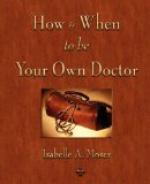Then there’s the unrelenting boredom of fasting. Most people have been media junkies since they were kids; the only way they believe they can survive another day of fasting is by diverting their minds with TV. This is far from ideal because often the emotions of a faster are like an open wound and when they resonate with the emotions portrayed on most TV shows, the faster gets into some very unpleasant states that interfere with healing. And the emotions many movies prompt people to sympathetically generate are powerful ones, often highly negative, and contrary to healing. Especially unhelpful are the adrenaline rushes in action movies. But if TV is the best a faster can do, it is far better that someone fast with television programming filling their minds than to not fast at all. I keep a library of positive VHS tapes for these addicts—comedies, stories of heroic over-comings, depiction’s of humans at their best.
Boredom is probably the most limiting factor to fasting a long time. That is because boredom is progressive, it gets worse with each slowly-passing day. But concurrently, the rate of healing is accelerating with each slowly-passing day. Every day the faster gets through does them considerably more good than the previous day. However, fasters rarely are motivated enough to overcome boredom for more than two weeks or so, unless they started the fast to solve a very serious or life-threatening condition. For this reason, basically well people should not expect to be able to fast for more than a couple of weeks every six months or year, no matter how much good a longer fast might do.
Exercise While Fasting
The issue of how much activity is called for on a fast is controversial. Natural Hygienists in the Herbert Shelton tradition insist that all fasters absolutely must have complete bed rest, with no books, no TV, no visitors, no enemas, no exercise, no music, and of course no food, not even a cup of herb tea. In my many years of conducting people through fasts, I have yet to meet an individual that could mentally tolerate this degree of nothingness. It is too drastic a withdrawal from all the stimulation people are used to in the twentieth century. I still don’t know how Shelton managed to make his patients do it, but my guess is that he must have been a very intimidating guy. Shelton was a body builder of some renown in his day. I bet Shelton’s patients kept a few books and magazines under their mattress and only took them out when he wasn’t looking. If I had tried to enforced this type of sensory deprivation, I know my patients would have grabbed their clothes and run, vowing never to fast again. I think it is most important that people fast, and that they feel so good about the experience that they want to do it again, and talk all their sick friends into doing the same thing.
In contrast to enforced inactivity, Russian researchers who supervised schizophrenics on 30 day water fasts insisted that they walk for three hours every day, without stopping. I would like to have been there to see how they managed to enforce that. I suspect some patients cheated. I lived with schizophrenics enough years to know that it is very difficult to get them to do anything that they don’t want to do, and very few of them are into exercise, especially when fasting.




